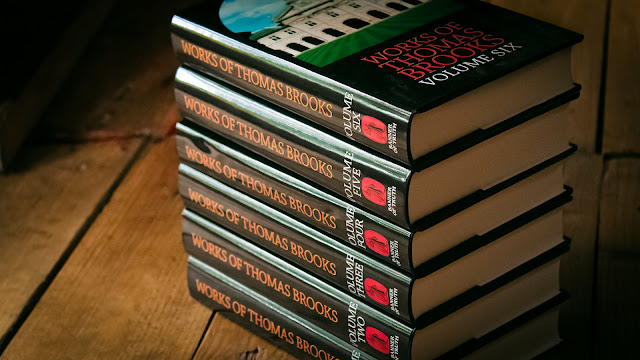Puritan Works
The Works of Thomas Brooks
The definitive edition of the Works of Thomas Brooks, here reissued, was first published by James Nichol in 1866. It was edited by A. B. Grosart. At that time, C. H. Spurgeon commented in The Sword and the Trowel:
‘The volumes now before us are by that marvelously rich author Thomas Brooks, whose wealth of imagery surpasses all others of his age. The mere marginal notes of Brooks are more valuable than pages of ordinary writers; we take pleasure in the stone of his temple, and the very dust thereof we favour. Of all the Puritans he is the most readable, if we except John Bunyan; and if he cannot display the depth of Owen or the raciness of Adams, he leaves them far behind in excessive [unusual] sweetness and sparkling beauty of metaphor. There is a clear, silvery, refreshing sound in the name “Brooks”, and as is the name, such is the man. Every reader who can afford the money should purchase this incorrupt, unmutilated, unchanged, well-printed and perfectly edited copy of Brooks.’
Brooks’ popularity lies both in his subjects – practical truths, central to the Christian life – and in the manner of his presentation. He is ever direct, urgent, fervent, full of Scripture and able to choose words which make his sentences as memorable as melodies.
The Works of John Flavel
John Flavel (1628-1691), son of a Puritan minister who died in prison for his Nonconformity, was educated at University College, oxford, and laboured for almost the entire period of his ministry at Dartmouth, Devon. Having all the characteristics of the tradition to which he belonged — a tradition which believed that preaching should be ‘hissing hot’, searching, and expository — Flavel attained to pre-eminence in his ability to combine both instruction and appeal to the heart. Some Puritans might be more learned than he, and some more quaint, but for all-round usefulness none was his superior.
The repeated editions of Flavel’s Works bear their own witness to his popularity: five times were The Works of John Flavel issued in the 18th century and at least three times in the 19th. He was a favourite with Jonathan Edwards and George Whitefield (who ranked him with John Bunyan and Matthew Henry), and, a century later, with such Scottish evangelical leaders as R. M. M’Cheyne and Andrew Bonar. But it was in the homes of Christian people that Flavel made his greatest appeal and influenced rising generations: Archibald Alexander, the first professor at Princeton Seminary, read him while still a ‘teenager’ and recorded in later life, ‘To John Flavel I certainly owe more than to any uninspired author.’
Flavel’s complete works had long been unobtainable until reprinted by the Trust in 1968. His six volumes are in themselves a library of the best Puritan divinity and a set will be a life-long treasure to those who possess it. He is one of that small number of evangelical writers who can by their lucidity and simplicity help those at the beginning of the Christian life and at the same time be a strong companion to those who near its end.
The Works of Richard Sibbes
After William Perkins, ‘the heavenly Doctor Sibbes’ was the most significant of the great Puritan preachers of Cambridge. This reprint of the complete seven-volume set of the Works of Richard Sibbes shows why this is so. Strong thoughts, simple sentences, deep knowledge of the Bible and the human heart and a sure pastoral touch are here revealed in Sibbes’ sustained concentration on the glory and grace of God in Christ.
More than anything else, Sibbes was a great preacher. He never lost sight of the fact that the best Christian counselling is done through the patient and lively exposition of the Word of God. Sibbes excelled as a comforter of the troubled and doubting, but he also possessed the rare gift of illuminating every passage of Scripture he handled by drawing out its significance for his hearers and readers. The republication of the Nichol edition of his complete works is a notable event for all who have an appetite for helpful and faithful biblical preaching.
The Works of Jonathan Edwards
Dr. D. M. Lloyd-Jones said ‘In my early days in the ministry there were no books which helped me more, both personally and in respect of my preaching, than this two-volume edition of The Works of Jonathan Edwards…I devoured these volumes and literally just read and read them. It is certainly true that they helped me more than anything else. If I had the power I would make these two volumes compulsory reading for all ministers! Edwards seems to satisfy all round; he really was an amazing man.’
According to B. B. Warfield the long hours Edwards spent in his study bore their richest fruit in his sermons. All of them are characterized by a plain, expository style, intense spirituality and an effort to impress on the hearers the reality of God, his grace and his wrath. His doctrine is all application, ‘Rabbi’ Duncan once said of Edwards, and his application all doctrine.
Here is a beautiful testimony from Rebecca Meyer
My set is well-worn over the past decade, pouring over them, confirming everything Lloyd-Jones found between these covers. Calvin’s Institutes first and foremost, but not to miss Jonathan Edwards…so very beautiful. At first I was bothered by the tiny print, then I found that to grasp the whole I needed those full pages to refer back to and read carefully through. Now I appreciate the small type. Reserve large blocks of time for each sitting…don’t cheat yourself with a few minutes here and there, or you’ll miss the glorious big picture he develops. Blessings.
All Book Descriptions from Banner of Truth.






Comments
Post a Comment